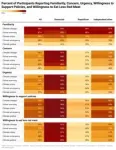(Press-News.org) People with type 2 diabetes are at increased risk of Alzheimer's disease and other cognitive problems. A new study led by Umeå University, Sweden, shows that the reason may be that people with type 2 diabetes have more difficulty getting rid of a protein that may cause the disease.
"The results may be important for further research into possible treatments to counteract the risk of people with type 2 diabetes being affected by Alzheimer's," says Olov Rolandsson, senior professor at the Department of Public Health and Clinical Medicine at Umeå University, research leader and first author of the study.
The substances that the researchers have studied are two so-called beta-amyloids, which are among the most important components of the plaques found in the brains of people with Alzheimer's disease.
The researchers measured the concentrations in the blood of the beta-amyloids Aβ1-40 and Aβ1-42 as well as of an enzyme that breaks down the beta-amyloids in a test group with type 2 diabetes and in a healthy control group. The two groups were given infusion of glucose for four hours, which induced acute hyperglycaemia, i.e. high blood sugar levels, after which repeated samples were taken from the subjects.
Immediately after the infusion of the sugar solution, the groups had similar values. Soon, the values of beta-amyloids fell sharply in the control group, while the values of the amyloid-degrading enzyme rose. Among the group with type 2 diabetes, there were no changes, i.e. the levels of beta-amyloid did not decrease, nor did there be an increase in the enzyme that breaks down amyloid.
The results indicate that the body in people with type 2 diabetes does not have the same ability as in healthy people to take care of beta-amyloid, which could increase the risk that it is then stored in the brain and causes cognitive diseases such as Alzheimer's.
"More research is needed to confirm the results of this limited study. Hopefully, in the long term, it can also lead to new treatments. But the findings underline the importance of preventing type 2 diabetes as far as possible and that people who do have it should avoid having episodes of high blood sugar," says Olov Rolandsson.
The study was conducted on ten people with type 2 diabetes and eleven people without diabetes in the control group. The participants were aged 66–72 years.
People with type 2 diabetes are at increased risk of Alzheimer's disease and other cognitive problems. A new study led by Umeå University, Sweden, shows that the reason may be that people with type 2 diabetes have more difficulty getting rid of a protein that may cause the disease.
"The results may be important for further research into possible treatments to counteract the risk of people with type 2 diabetes being affected by Alzheimer's," says Olov Rolandsson, senior professor at the Department of Public Health and Clinical Medicine at Umeå University, research leader and first author of the study.
The substances that the researchers have studied are two so-called beta-amyloids, which are among the most important components of the plaques found in the brains of people with Alzheimer's disease.
The researchers measured the concentrations in the blood of the beta-amyloids Aβ1-40 and Aβ1-42 as well as of an enzyme that breaks down the beta-amyloids in a test group with type 2 diabetes and in a healthy control group. The two groups were given infusion of glucose for four hours, which induced acute hyperglycaemia, i.e. high blood sugar levels, after which repeated samples were taken from the subjects.
Immediately after the infusion of the sugar solution, the groups had similar values. Soon, the values of beta-amyloids fell sharply in the control group, while the values of the amyloid-degrading enzyme rose. Among the group with type 2 diabetes, there were no changes, i.e. the levels of beta-amyloid did not decrease, nor did there be an increase in the enzyme that breaks down amyloid.
The results indicate that the body in people with type 2 diabetes does not have the same ability as in healthy people to take care of beta-amyloid, which could increase the risk that it is then stored in the brain and causes cognitive diseases such as Alzheimer's.
"More research is needed to confirm the results of this limited study. Hopefully, in the long term, it can also lead to new treatments. But the findings underline the importance of preventing type 2 diabetes as far as possible and that people who do have it should avoid having episodes of high blood sugar," says Olov Rolandsson.
The study was conducted on ten people with type 2 diabetes and eleven people without diabetes in the control group. The participants were aged 66–72 years.
People with type 2 diabetes are at increased risk of Alzheimer's disease and other cognitive problems. A new study led by Umeå University, Sweden, shows that the reason may be that people with type 2 diabetes have more difficulty getting rid of a protein that may cause the disease.
"The results may be important for further research into possible treatments to counteract the risk of people with type 2 diabetes being affected by Alzheimer's," says Olov Rolandsson, senior professor at the Department of Public Health and Clinical Medicine at Umeå University, research leader and first author of the study.
The substances that the researchers have studied are two so-called beta-amyloids, which are among the most important components of the plaques found in the brains of people with Alzheimer's disease.
The researchers measured the concentrations in the blood of the beta-amyloids Aβ1-40 and Aβ1-42 as well as of an enzyme that breaks down the beta-amyloids in a test group with type 2 diabetes and in a healthy control group. The two groups were given infusion of glucose for four hours, which induced acute hyperglycaemia, i.e. high blood sugar levels, after which repeated samples were taken from the subjects.
Immediately after the infusion of the sugar solution, the groups had similar values. Soon, the values of beta-amyloids fell sharply in the control group, while the values of the amyloid-degrading enzyme rose. Among the group with type 2 diabetes, there were no changes, i.e. the levels of beta-amyloid did not decrease, nor did there be an increase in the enzyme that breaks down amyloid.
The results indicate that the body in people with type 2 diabetes does not have the same ability as in healthy people to take care of beta-amyloid, which could increase the risk that it is then stored in the brain and causes cognitive diseases such as Alzheimer's.
"More research is needed to confirm the results of this limited study. Hopefully, in the long term, it can also lead to new treatments. But the findings underline the importance of preventing type 2 diabetes as far as possible and that people who do have it should avoid having episodes of high blood sugar," says Olov Rolandsson.
The study was conducted on ten people with type 2 diabetes and eleven people without diabetes in the control group. The participants were aged 66–72 years.
END
Possible explanation for link between diabetes and Alzheimer's
2024-08-12
ELSE PRESS RELEASES FROM THIS DATE:
Surf spots are global ally in climate fight, study finds
2024-08-12
Surf Spots are Global Ally in Climate Fight, Study Finds
Nearly 90 million metric tonnes of planet-warming carbon found surrounding surf breaks across the world; U.S., Australia, Indonesia, Brazil identified as conservation priorities
ARLINGTON, Va. (Aug. 12, 2024) – A first-of-its-kind study, published today in Conservation Science and Practice, has found that the forests, mangroves and marshes surrounding surf breaks store almost 90 Mt (million metric tonnes) of climate-stabilizing “irrecoverable carbon,” making these coastal locations ...
Taking a ‘one in a million’ shot to tackle dopamine-linked brain disorders
2024-08-12
Dopamine, a powerful brain chemical and neurotransmitter, is a key regulator of many important functions such as attention, experiencing pleasure and reward, and coordinating movement. The brain tightly regulates the production, release, inactivation and signaling of dopamine via a host of genes whose identity and link to human disease continue to expand.
Brain disorders associated with altered dopamine signaling include substance use disorder, attention deficit hyperactivity disorder (ADHD), autism, bipolar disorder, schizophrenia and Parkinson’s disease. The complexity of the human brain and its ...
Just say “climate change” – not “climate emergency”
2024-08-12
The terms “climate change” and “global warming” are not only more familiar to people than some of their most common synonyms, but they also generate more concern about the warming of the Earth, according to a USC study published today in the journal Climatic Change.
The study began by looking at how familiar people are with the terms “global warming,” “climate change,” “climate crisis,” “climate emergency,” and “climate justice.” ...
Mature forests vital in frontline fight against climate change
2024-08-12
Mature forests have a key role to play in the fight against climate change – extracting carbon dioxide (CO2) from the atmosphere and locking it into new wood, a new study reveals.
Researchers discovered that older trees responded to increased atmospheric levels of CO2 by increasing production of woody biomass – countering existing theories that mature woodland has no capacity to respond to elevated CO2 levels.
The experts found exposure to elevated levels of the greenhouse gas (ambient ...
Balancing technology and governance are key to achieving climate goals
2024-08-12
Despite advancements in clean energy, global CO2 emissions continue to rise. IIASA researchers contributed to a new international study that underscores the importance of integrating technological advancements with robust institutional capacities to formulate effective climate policies.
The Paris Agreement's goal to limit global warming to 1.5°C demands rapid reductions in CO2 emissions and heightened attention to non-CO2 greenhouse gases. Despite advancements in clean energy, global CO2 ...
Align or die
2024-08-12
A previously unknown mechanism of active matter self-organization essential for bacterial cell division follows the motto ‘dying to align’: Misaligned filaments ‘die’ spontaneously to form a ring structure at the center of the dividing cell. The study, led by the Šarić group at the Institute of Science and Technology Austria (ISTA), was published in Nature Physics. The work could find applications in developing synthetic self-healing materials.
How does matter, lifeless by definition, self-organize and make us alive? One of the hallmarks of life, self-organization, is the spontaneous formation ...
Breakthrough heart MRI technique accurately predicts heart failure risk in general population
2024-08-12
New research looking at more than 39,000 UK biobank participants found those with higher heart pressure estimated by Magnetic Resonance Imaging (MRI) were five times more likely to develop heart failure
Key risk factors discovered for increased heart pressure include age over 70, high blood pressure, obesity, alcohol consumption and male gender
Breakthrough by University of East Anglia and Queen Mary University of London suggests that heart MRI could potentially replace invasive diagnostic tests
Peer-reviewed – Observational Study - People
MRI scans could replace invasive heart tests, as new research shows they can reliably estimate pressures ...
Global study predicts increases in cancer cases and deaths among men, with widening disparities based on age and countries’ economic status
2024-08-12
In an analysis of 30 cancer types among men, investigators uncovered substantial disparities in cancer cases and deaths by age and countries’ economic status—disparities that are projected to widen by 2050. The study is published by Wiley online in CANCER, a peer-reviewed journal of the American Cancer Society.
Men face higher rates of cancer and cancer-related deaths than women, likely due to various factors including lower participation in cancer prevention activities; underuse of screening and treatment options; increased exposure to cancer risk factors such as smoking, alcohol consumption, and occupational exposure to carcinogens; and biological ...
USC study: Drug protects against air pollution-related Alzheimer’s signs in mice
2024-08-12
A new study led by the USC Leonard Davis School of Gerontology shows how feeding mice a drug called GSM-15606 provided protection against air pollution-related increases in proteins linked to Alzheimer’s disease.
Senior author Caleb Finch, USC University Professor and holder of the ARCO/William F. Kieschnick Chair in the Neurobiology of Aging at the USC Leonard Davis School, has studied air pollution’s effects on the brain for several years, especially the consequences of exposure to fine particulates found in pollution from automobiles, factories and more. ...
Mild Cognitive Impairment could be going unreported in rural areas of west Michigan, study suggests
2024-08-12
Grand Rapids, Mich., Aug. 12, 2024 – Corewell Health™ and Michigan State University researchers are the first in the state to use de-identified electronic health records of more than 1.5 million patients to analyze incidence rates and risk factors of mild cognitive impairment, or MCI, in rural and urban areas in West Michigan.
Results showed that many cases could be going undetected among those living in rural communities in the area, and researchers now will use the findings to develop AI tools that can detect MCI earlier among patients across the country.
The retrospective study, which included 10 years of historical patient ...





